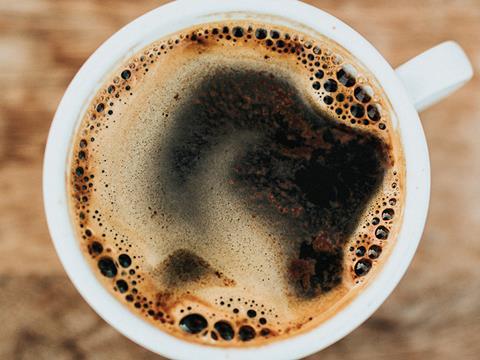
For many cash-conscious Brits, regular trips to their local coffee are now off the cards. For others, even a cafetière of joe at home is out of budget. Or too much faff.
So, for an affordable and convenient caffeine hit, more shoppers are turning to instant coffee. Or more specifically own label lines. Their volumes have grown 8.8% – albeit from a much smaller base than brands – in a market down 5.7% overall.
In a cost of living crisis, this growth makes sense. Own label instant coffee is 32.4% cheaper than brands on average. Put another way, branded instant is 67.6% more expensive than own label. And this vast difference in price has hurt leading brands’ volume sales. Eight of the top 10 are in volume decline.
Shoppers turn to instant coffee
Category leader Nescafé is no exception, with an instant portfolio spanning its core Original, mid-tier Gold Blend and premium Azera ranges. At an average price 4% higher than brands overall, they’ve seen volumes fall 10%, though sales value is up 20.8%.
“Shoppers across the board have all experienced a squeeze in 2023 with high inflation in grocery and beyond forcing many households to make different spending choices,” says Sophie Demoulin, Nescafé marketing director at Nestlé. “Nescafé, as the category leader, has not been immune to this.”
However, she’s confident new launches, such as Gold Golden Honeycomb Aero Mocha, added in July, will revive interest in the brand. They have been “driving incremental category growth by bringing new shoppers into the category and creating exciting consumption moments”, she adds.
Behind Nescafé in the top 10 sit the JDE trio of Kenco, Douwe Egberts and L’Or. Their volumes have fallen 7.7%, 18.3% and 14.1% respectively. Like their larger rival, they’ve been banking on product launches to reverse their fortunes.
plant-based variants, Oat Latte and Almond Latte, in the summer. The latter brand’s innovations were “based on genuine consumer insight to attract new and existing customers to the category”, says JDE marketing director Roberto De Felice.
Two top 10 brands attracting customers with aplomb are high street icons Costa Coffee and Starbucks. They’ve made volume gains in instant coffee of 235.8% and 28.3% respectively.
The cost of a take-out coffee ramped up
For Costa, success was “fuelled by strong distribution and rate of sale growth, as consumers increasingly look to recreate coffee shop experiences within the home”, says the brand’s head of fmcg, Mark Cumming.
That’s an understandable trend given the price of a coffee out of home nowadays. A flat white in Costa is £3.55; a 100g tin of the brand’s Smooth Medium Roast works out at about 50p per cup in a supermarket.
“Under inflationary pressure, shoppers are more cautious about their weekly spend,” confirms Alice Li, NIQ senior analytics executive. That means “there is a premiumisation opportunity” in grocery, she adds. “More affluent shoppers are trading down from the on-trade to a good quality cup at home.”
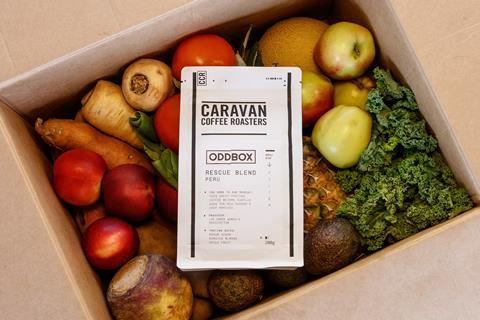
Caravan Coffee Roasters teamed up with Oddbox in March to launch “waste-fighting” coffee. Rescue Blend comprised ‘past crop coffee’ – the beans remaining from a previous crop as a fresh harvest arrives. Older crops, which typically go to waste, had been salvaged to create two limited-edition SKUs, available through Oddbox. Each purchase meant “you’re helping to ensure each and every bean gets enjoyed”, said Caravan head of coffee Andrea Otte.
The move from coffee shop to supermarket aisle is good news for ground coffee. Like instant, it’s seen volume declines decelerate since 2022 to 2.0%. Unlike instant, brands are the star performers. They’re down just 1%, compared with own label’s 4.9% fall in volumes.
Number two brand Taylors of Harrogate has been a key beneficiary of trading down from out-of-home. Its range – which includes 100% arabica blends from Brazil, Colombia, Ethiopia and Indonesia – has added 219.5 thousand kilos of grounds and beans. That’s roughly an extra one million packs.
Closing in on Taylors is third-placed Lavazza. The rivals are now just £1.3m apart, after the latter added £6.9m on volumes up 5.3%. Sales were driven by “new product lines such as our Tierra organic.
A move from coffee shop to supermarket coffee aisle
“New listings of Tierra have introduced Lavazza to more shoppers. We’re currently working on our Premiumisation in ground coffee has also served challengers well. Take Löfbergs, the Scandinavian brand that made its UK debut in November 2022. It’s already worth £2.7m.
Then there’s Ueshima Coffee Company, which rolled out its first ATL campaign in May. The undisclosed investment was instrumental in a £1.6m value gain on units up 127.9%, claims Phil Smith, the brand’s head of category & insight.
Extending the campaign with in-store activations has “helped to drive sales performance in our two biggest retailer listings”, he adds.
UCC’s latest listings are for nine lines in 250 , and it will soon expand its offer in . Which suggests retailers are banking on posh coffee at home for a while to come.
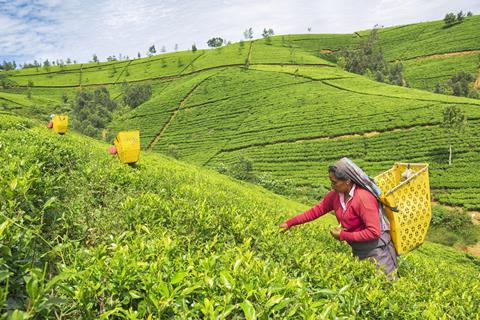
Sourcing concerns continue. , Tetley and Twinings were among major tea buyers under fire in May, for example, accused by the Business & Human Rights Resource Centre of failing to address abuses on a number of plantations. Workers were found to face unfair wages, inhumane living standards and poor health & safety conditions. The majority of retailers and brands named said they had promptly investigated the cases brought to their attention.
While coffee sales are heating up, tea’s performance has gone off the boil. The pace of its volume decline has picked up – to 6.8% from the 3.5% in last year’s report. Some household names have been hit hard. Twinings, Tetley and PG Tips have shifted four million fewer kilos in total.
Higher average prices helped Twinings and Tetley to value gains. PG Tips, however, has suffered a £2.8m loss. But instead of stewing about another disappointing year, owner Lipton Teas & Infusions relaunched the brand in September, giving it new packaging and quick-brewing teabags.
“The tea market hasn’t always appreciated its own worth, but this relaunch is a move towards giving customers an opportunity to see the product’s real value,” Liam McNamara, PG Tips general manager, said at the time.
How did hot tea sales perform in 2023?
No such action is required by Yorkshire Tea. The market leader has bucked the downward trend in volumes, adding 448.8 thousand extra kilos. Value has grown £12.8m.
Senior brand manager Liz Griffin says pushes such as its musical ‘Pack Yer Bags’ summer campaign and the ‘Where Everything’s Done Proper’ ad starring Patrick Stewart have helped the brand remain relevant in a competitive landscape.
“As a brand, the way we talk to consumers is important to us. We don’t take ourselves too seriously and our drinkers seem to like that,” she says. “We continue to invest in our brand campaigns to keep Yorkshire Tea top of mind with our drinkers and to increase our appeal to new drinkers experiencing us for the first time.”
Teapigs is another brand on the up, having grown volumes 15.1%. The premium brand’s been buoyed by its status as an affordable luxury in an inflationary environment, claims Dan Adams, senior category manager for owner Tata Consumer Products.
“Premium teas provide ‘a treat for me’ experience and real opportunities for growth, as shoppers are adjusting their lifestyles to manage their budgets better,” he says.
As to the hot chocolate & malted drinks sector, volume decline has slowed from last year’s 13.7% to 5.7%. Amid so much inflation in cocoa, sugar and dairy – and limited innovation – it’s actually a decent result.
Top Launch 2023
PG Tips relaunch | Lipton Teas & Infusions
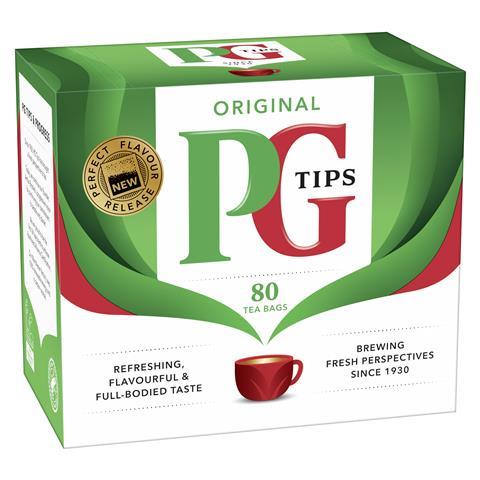
PG Tips was once a pop culture touchstone thanks to the anthropomorphic chimpanzees in its TV ads. In later years, however, its presence and sales both waned. Then Unilever sold the brand to Lipton Teas & Infusions. Enter a new blend that provides “a brighter, smoother more consistent” cuppa in less than a minute. It’s just one aspect of a two-year, £50m relaunch for PG Tips, also encompassing biodegradable teabags and refreshed packaging across Original, Gold and Decaf.
Face off: Top Products Survey 2023 pits brands vs own-label
![Beans Face Off_RGB[18]](https://dmrqkbkq8el9i.cloudfront.net/Pictures/261x166/9/5/1/311951_beansfaceoff_rgb18_56926_crop.jpg)
It’s no longer a battle of the brands. The bigger battle, after two years of inflation, is between brands and own label. Who’s winning?
- 1
- 2
- 3
- 4
- 5
- 6
- 7
- 8
- 9
- 10
- 11
- 12
- 13
- 14
- 15
- 16
- 17
- 18
- 19
- 20
- 21
- 22
- 23
- 24
 Currently
reading
Currently
reading
Hot beverages 2023: Cost of living boosts own label instant coffee
- 26
- 27
- 28
- 29
- 30
- 31
- 32
- 33
- 34
- 35
- 36
- 37
- 38
- 39
- 40
- 41
- 42
- 43
- 44
- 45
- 46







![Beans Face Off_RGB[18]](https://www.thegrocer.co.uk/Pictures/80x50/9/5/1/311951_beansfaceoff_rgb18_56926_crop.jpg)













































![Beans Face Off_RGB[18]](https://dmrqkbkq8el9i.cloudfront.net/Pictures/80x50/9/5/1/311951_beansfaceoff_rgb18_56926_crop.jpg)












































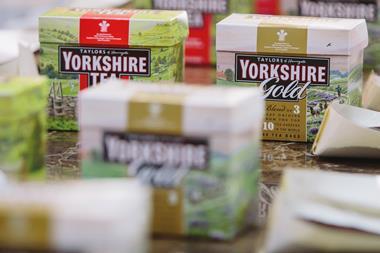
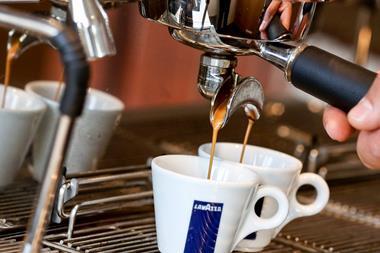
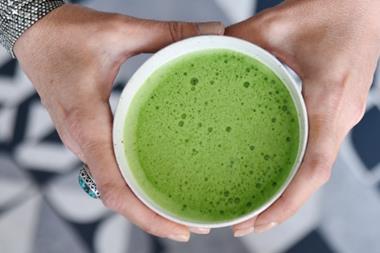

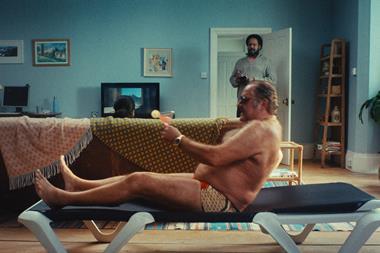
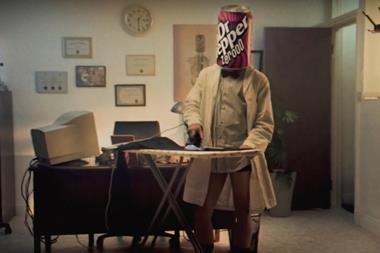






No comments yet